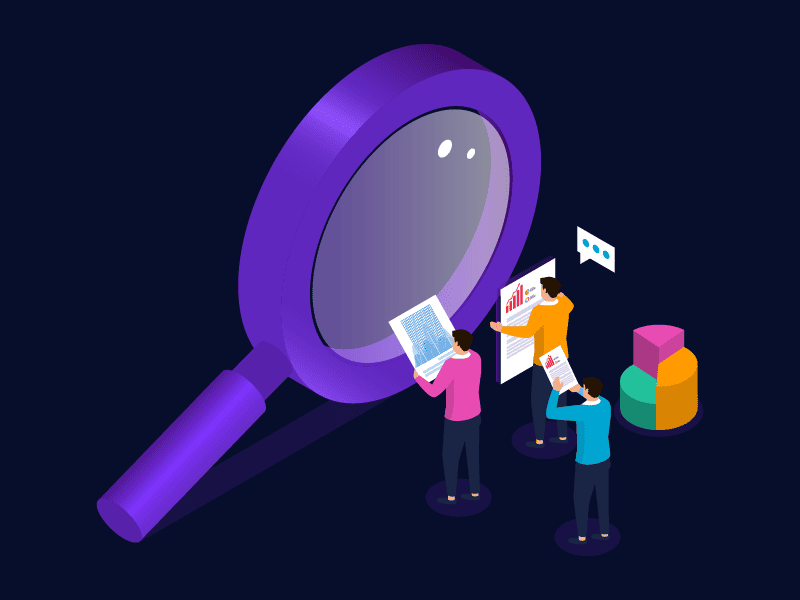SEO meets AI
This may not be your first time hearing about SEO, but it may be your first time reading about SEO and AI. Regardless—hi! In this article I want to delve into SEO amid the rise of AI and tools such as ChatGPT which is taking the online world by storm. I’m looking at this from a neutral ground: what’s good and what’s possibly bad about the rise of AI in search engines and what does this mean for Search Engine Optimisation (SEO) as we know it?
What is SEO? Let’s go back to basics.
Search Engine Optimisation is a combination of processes with the goal of improving your website’s visibility on the SERP[1] and as a result, getting more organic traffic.

By rule of thumb, the higher you rank, the more people visit your page. According to SEMrush, the top three organic results get more than 50% of all the clicks. But our efforts don’t stop when we’re high up on the SERP. Your content must fulfil the user’s search needs: Are your users searching with the intent[2] to purchase or to gather information? And once we get that traffic clicking through to your website, is the website optimised[3] in a way to keep that traffic there and convert it? Luckily, you don’t need to worry about that because that’s my job.
What does the rise of AI mean for SEO as we know it?
Introduced in late 2022 but only released in May 2023, ChatGPT has been the topic of many online discussions. People have started to use the bot for time-saving copywriting, which prompted talks about whether certain skillsets will be made redundant and if this AI-powered chatbot is here to assert dominance in the digital landscape as we know it.
It’s impossible to say for sure how AI will impact SEO until the cogs start turning and we begin to see changes to what we usually know. SEO experts and marketers are already taking to social media and writing articles sharing their predictions of a revolution and predictions of an apocalypse, but they currently remain just that – predictions. Nonetheless, they’re helpful insights to consider when strategising for the future.
RIP to Paid SEO Tools
Some predict ChatGPT and its new SEO Plugins will be the death of our paid SEO tools:
RIP to Paid SEO Tools.
— Sharyph (@sharyph_) June 8, 2023
ChatGPT Plugins are changing the SEO game.
Here are 5 ChatGPT SEO Plugins you don't want to miss:
These plug-ins sound cool and insightful, but by no means should they be used to drive an entire SEO strategy. Perhaps the key indicator here is that these plugins are free and we’re over here using paid SEO tools (hence the title RIP Paid SEO Tools). But for me, the depth in which these tools delve into SEO just won’t suffice when it comes to making informed and evidence-based decisions/iterations to an SEO strategy.
We could by all means use these tools to audit, but we need to be able to interpret data which is where the human element comes in. ChatGPT can tell us X, Y and Z, but ultimately, how do we evaluate this data and make decisions that contribute towards goals? Can the ChatGPT SEO Assistant provide us with ranking difficulty? What about the search intent? Or the search volume? It’s a clever tool—yes—but will it really be able to take away the power of human’s interpreting data?
How AI could revolutionise the future of SEO[4]
On the other side, some predict AI will revolutionise SEO by enhancing Google’s search algorithms with more accuracy and personalisation. Keyword research and content optimisation are also predicted to improve with on-page SEO[5] recommendations and generation. Predictive SEO can help businesses detect potential algorithm updates and adjust strategies accordingly. And as voice recognition technology continues to dominate our devices (Apple’s Siri and Amazon’s Alexa) AI can help analyse these voice queries and provide insights on content optimisation for voice search. What’s more, AI-powered chatbots could provide instant assistance, though I speak for myself (and I guarantee a few of you) when I say this: there is nothing more frustrating than being met with a Hi, I’m Amelia, your AI Assistant, when you just want to speak to another human being and have been met with Sorry, I didn’t quite understand that, at least five times already.
We will always crave that human element and something real
It begs the question if AI continues to develop the way it is, and let’s say for example ChatGPT begins to dominate content creation (which is a believable prospect), will there come a point where Google has a responsibility to claim what’s written by humans and what’s written by robots? Similarly to the way Instagram told its influencers they had to start claiming their paid advertisements (which isn’t seen as authentic compared to their organic content). If Google don’t develop something to detect real human work, how can content generated by AI in the click of a button be ranked on par with authentic, researched and content-rich articles?
To conclude…
I don’t believe AI is apocalyptic to SEO, though at this point it’s hard to say it’ll also revolutionise it. I believe it’ll change the way we search informationally, and I believe it will assist our already available tools as a free alternative, but we will always rely on human skills, thought processes and creativity to decide whether something is good or bad for the overall strategy of an organisation—which differs for every business and unfortunately, even AI cannot know every individual firm’s strategy. But then again, here I am with my predictions based off other people’s predictions, just like everyone else!
Regardless, you either choose to use these new tools or don’t, but don’t get left behind in the new wave. Make sure you’re aware of what’s out there and what you can utilise as the technological world continues to evolve.
Disclaimer: everything in this article that is not directly referenced to an external source is opinion-based and an interpretation of information already out there. It is not to be taken as facts.
If you want to have a chat about our SEO services, email Olivia here or you can contact the wider team using the form below.
Contact Us
"*" indicates required fields

[1] SERP: Search Engine Results Page. When you type into Google, your results that you see is the SERP.
[2] There are different search intents in SEO, which means certain keyword searches have different intentions behind them. Sometimes, users want to find information and sometimes they want to buy from you. You can read about the different search intents here.
[3] Users expect high-quality content, a seamless user experience and fast page-load times. Not to try and sell to you here (maybe I am), but that’s why we offer the full service at Accesspoint: SEO, website design and digital marketing. Sometimes, having your site and SEO managed by different agencies can create a disjointed approach where your site designers have no idea what the SEO strategy is for the business and fail to incorporate this into the new designs and development of the site.
[4] All predictions in this paragraph have been taken from a recent article by Alex Bider, CEO and Senior Internet Marketing Consultant.
[5] On-page SEO refers to meta tags, headings and the way content is optimised on the page to cater favourably towards search engines and the keyword you wish to rank for.

